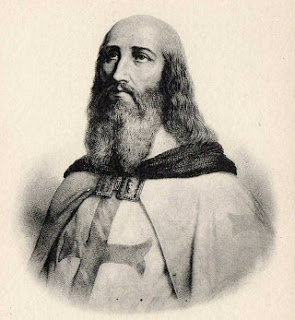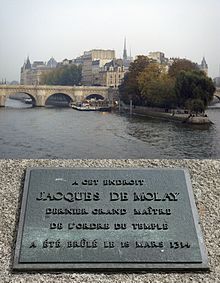The Templars
The original Templars were founded in the 12th Century to guard pilgrims on their way along the dangerous roads that led to Jerusalem. Its members were effectively armed monk-like knights who were granted certain legal privileges and whose status was backed by the church. They were reputed to be the possessors of great wealth and power.
King Philip IV
 In 1306, King Philip IV expelled all Jews
from France, seizing their property and confiscating the monies owed to
them. Philip’s devotion to St. Louis was witnessed that same year by
elaborate ceremonies in his honor, and Louis’s anti-Semitic proclivities
might have inspired Philip to act against the Jews, whose usefulness as
a source of regular revenue had in any case been exhausted by his
earlier repeated impositions.
In 1306, King Philip IV expelled all Jews
from France, seizing their property and confiscating the monies owed to
them. Philip’s devotion to St. Louis was witnessed that same year by
elaborate ceremonies in his honor, and Louis’s anti-Semitic proclivities
might have inspired Philip to act against the Jews, whose usefulness as
a source of regular revenue had in any case been exhausted by his
earlier repeated impositions.
Feeling his oats from his successful removal of the Jews, King Philip then attacked the Knights Templars,
the wealthy, powerful, independent crusading order that had long acted
as the French monarchy’s financial agent. Philip’s newfound interest in
uniting the crusading orders made him mistrustful of the Templars’
opposition to such plans. Thus, he was receptive to charges of heresy
and sodomy presented against them in 1305, and so in September 1307, he ordered the seizing all Knights Templars in France.
Pope Clement V
Pope Clement V (1264 – April 20, 1314), born Bertrand de Goth (also occasionally spelled "Gouth" and "Got"), was Pope from 1305 to his death. He is memorable in history for suppressing the order of the Templars. He was Philip IV The Fair's
personal choice for Pope, and more or less served Philip's interests.
 |
| Clement on throne |
In 1311, Council of Vienne was convened to pass judgment. Most of its 300 members thought the charges unproved but Philip himself testified to the order's guilt. Then, the Bull Vox in excelsis, dated March 22, 1312, written by Clement, was read. In this Bull, "the pope said that though he had no sufficient reasons for a formal condemnation of the order, nevertheless, because of the common weal, the hatred borne them by the King of France, the scandalous nature of their trial, and the probable dilapidation of the order's property in every Christian land, he suppressed it by virtue of his sovereign power, and not by any definitive sentence." Many of the knights were executed, and the order's wealth was confiscated. Although the order's assets were meant to devolve to the Hospitallers, they were appropriated by Philip. The guilt or innocence of the Templars is one of the more difficult historical problems, partly because of the atmosphere of hysteria that had built up in the preceding generation and the habitually intemperate language and extravagant denunciations exchanged between temporal rulers and churchmen, and partly because the subject has been embraced by conspiracy theorists and pseudo-historians.
The Deaths
King Philip’s stubborn resolve to
defend morality and the faith was shown when, with royal acquiescence, the grand master of the Templars, Jacques de Molay,
was burned at the stake after retracting his earlier confession.
The
death of Clement V was a blow to King Philip. Shortly after hearing of this death, the king had a minor stroke. Having regained strength, he travelled to his birthplace,
Fontainebleau, and there, a day before his death, he halted collection
of his last tax and provided for a crusading expedition to be conducted
in his name.
We now return you to your normal broadcasting.





